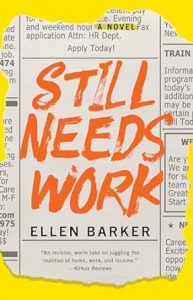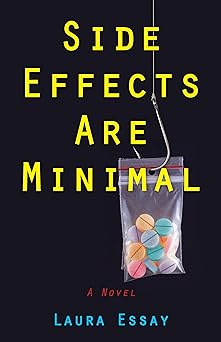Ellen Barker: Authors Interviewing Characters
 Ellen Barker’s provocative second novel, Still Needs Work (June 11, She Writes Press), addresses the still-pervasive difficulties of women working – and looking for work – especially in the tech marketplace.
Ellen Barker’s provocative second novel, Still Needs Work (June 11, She Writes Press), addresses the still-pervasive difficulties of women working – and looking for work – especially in the tech marketplace.
With the narrator Marianne as our eyes and ears into what many of us have experienced, Still Needs Work is an enlightening and thought-provoking read that encourages reflection on leaning in, on perseverance, and even on privilege.
Sharon (the boss) Character Interview by Ellen Barker, author of Still Needs Work, out June 11, by She Writes Press.
Still Needs Work
Marianne gets the call while attending a conference in San Francisco: laid off, department dissolved. Two days later, she’s back home in the dicey Kansas City neighborhood she moved to after a reversal of fortune two years earlier. Her house and her life still need work, and now she needs a job too.
Marianne tries all the usual routes to re-employment, but a middle-aged woman has little job cred in the tech world, regardless of her skills. A contract job at a Chicago startup morphs through two acquisitions in eight weeks. And then she’s mugged in her own neighborhood, which frightens her enough to consider a permanent relocation.
An irreverent look at the alien denizens of the tech world, the fraught business of mergers and acquisitions, and the parallel universe of job openings, Still Needs Work is a contemporary story of the working world wrapped around a very human story of one person, her dog, and her community.
Sharon was Marianne’s boss at the beginning of Still Needs Work
EB: You must know Marianne pretty well. How long were you her supervisor?
S: Several years, off and on. We both moved around a bit in the company. But yeah, I’ve known her forever.
EB: So it must have been hard, telling her that her department and her job were gone.
S: That was just such a stupid decision from the C-Suite. I tried to tell them, but no, their bonuses were at stake.
EB: They wouldn’t listen to you?
S: No, and when the chips fell a few months after she was gone, they still . . . I swear to—
EB: Speaking of swearing, I understand you are good at it. Or should I say effective?
S: Oh, that’s funny. I’m a Midwest-nice girl from Minnesota. I had to teach myself to swear. It’s just so effective when you spring it on someone who doesn’t expect it. But it’s tricky. You have to judge the room. For example, there’s swearing and then there’s the F-word, which it turns out is in its own category. You can’t use it until the head dude uses it. Even then, I wouldn’t risk that word. But if the guys are swearing and you aren’t, they see you as prudish and think they have to hold back. And so they settle the tab and say goodnight and reconvene in another bar where they can drink and swear—and that’s where the critical decisions are made and critical information gets passed around. But you aren’t there.
EB: Sounds like middle school, when the cool kids ditch the nerdy one.
S: And the nerdy kid always knows.
EB: But Marianne couldn’t work out the swearing thing?
S: She understands it, but her heart just isn’t in it. She can’t turn off her BS detector. So she wasn’t at the secret drinking sessions and never got a “She can really hold her liquor” badge. Which is more important than any certification.
EB: And that held her back?
S: Look, it’s almost impossible to penetrate the upper echelons in tech. It’s not just drinking and swearing. She hadn’t quite stomped “sorry” out of her vocabulary for one thing. As soon as you say sorry, you lose power. Oh, and being tall doesn’t help. Most men in power don’t like it when women can look down on their bald spots. And when you’re already tall, high heels make it worse. So you can’t wear them when you need to look that little bit sexy. You come off as dowdy. Me, I’m right in the middle, so I can make myself taller when I need to look powerful and shorter when I don’t want to scare the guys.
EB: Sounds exhausting.
S: So exhausting.
EB: But you’ve managed to rise up anyway.
S: Not to the C-suite, and it’s unlikely now.
EB: Any regrets?
S: Well, maybe one. When I started college, I wanted to do pre-med. Women were starting to be accepted as doctors and I thought that was it. But my faculty adviser said high-tech would be the next frontier for women. So I switched to computer science, and I was good at it, and I even got an MBA, but barriers are higher in tech than in medicine. More impenetrable. Invisible even.
EB: Why is that?
S: Think about it. People were skeptical about the first female doctors, but once female patients started seeing female OB/GYNs and pediatricians, that all shifted quickly. Women—half the population—chose women doctors. But no one chooses who designs or makes or sells them their mobile phone. And you can’t choose when you call tech support. Half the time you get a bot named Micalio who isn’t even a human.
EB: You are right about that. You should write a book!
S: Right? All those crap books about finding your inner something or working smarter. Ugh. The real deal is Think Like a White Man. Have you read that one? Funny as heck, absolutely true, and in the end you think: Mmmmmaybe I don’t want to be such a horrible excuse for a human. I mean, it’s a spoof, which makes it just so powerful. If I had read it ten years ago. . . .
EB: Sounds like Marianne might want to read it.
S: Marianne is the one who told me about it. Like I said, she gets it, she just doesn’t like to play the game as much as I do.
EB: So is Marianne going to be okay? Is she going to find work, the right work?
S: Oh of course. She’s strong, she’s a problem solver, and she knows her stuff. And I think she’s stronger now, since she moved to Kansas City and took on her wreck of a house, living in a gritty neighborhood. Her voice is different, more confident. Living in that neighborhood – I think it’s called East of Troost – she’s been forced to rethink who she is and what’s important. She seems so . . . grounded now. People will see that, whether they are just meeting her or whether they know her already. As I said, she’s strong and she’s a problem solver, and tons of people know that. One of them will need her and come looking for her. That’s the one advantage of being a little older in the job market. People know you. They trust you. And they see you for what you are, not what you think you are.
BUY STILL NEEDS WORK HERE
—
Ellen Barker grew up in Kansas City during a period of demographic upheaval, and she returns there in her novels. She has a bachelor’s degree in urban studies from Washington University in Saint Louis, where she developed a passion for how cities work, and don’t. She began her career as an urban planner, then spend many years working for large consulting firms, first as a writer-editor and later managing large data systems, jobs rich in corporate drama large and small. She is the author of East of Troost, which introduced readers to the neighborhood where The Breaks takes place, and Still Needs Work, which takes place in the same area. She now lives in Los Altos, California, with her husband and their German shepherd, Boris, who is the inspiration for the dog in this novel.
Category: Interviews, On Writing

























